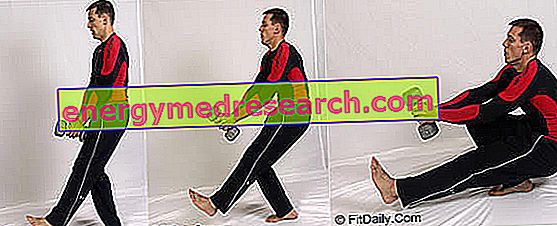Generality
Dry hair can be the result of imbalances inside or outside the body, although environmental causes often prevail.

Causes
As mentioned, the underlying causes of the appearance of dry hair can be either of internal origin in our body, or of external origin and, in particular, of environmental origin.
Among the environmental factors mainly responsible for dry hair, in fact, we find:
- The intense solar irradiation;
- The wind;
- Salt water.
Among the most dangerous dangers to which hair is exposed daily, we also mention:
- The frequent use of some cosmetic treatments (permanent bleaching, excessive closeness of the hair dryer to the scalp etc.);
- The use of detergents or excessively aggressive products (such as dyes) or not suitable for your type of hair;
- Contact with irritants (such as, for example, chlorine contained in swimming pool water).
In addition to this, dry hair can also be the result of poor sebaceous activity or, more rarely, of certain pathological conditions, such as anemia or thyroid disorders (hypo- or hyperthyroidism).
Finally, at the origin of the problem there may also be nutritional factors, such as a diet that is too rigid or lacking in vitamins and essential fatty acids.
In many cases, dryness only affects the tips and not the entire hair shaft. In such situations, the causes - more than of internal origin - are of external origin and mainly due to incorrect treatments or excessive and unprotected exposure to various environmental and atmospheric factors.
Features
Dry hair gives the hair what can be called a "straw effect". In fact, dry hair is characterized by a dull, dull and arid appearance.
Furthermore, hair that suffers from dryness tends to break easily and give rise to split ends very easily.
Useful tips
Whatever the origin of the problem, in the case of dry hair the following tips may be useful:
- Use shampoos that are not aggressive and, unlike what is suggested for greasy hair, reduce the frequency of washing.
- Even the amount of shampoo used, to be found among the less aggressive products, will be reduced, consequently increasing the use of balms specifically designed to give dry hair a more toned appearance.
- Keratin-based lotions and oral supplements will instead help to strengthen them from the inside, increasing their thickness.
- Dry hair can be treated and rehydrated even using specific products based on vegetable oils, such as those made from almond, walnut, wheat germ or Argan seeds.
- Especially in summer, it is a good idea to protect the hair with a hat or with oils, gels and sprays containing sunscreens and moisturizing substances, such as Shea butter, Jojoba and vegetable oils. Even the sand and salt water of the sea, as well as that rich in chlorine in the pools, accentuate the dryness of the hair.
- Dry hair is very delicate and breaks easily; for this reason it is necessary to brush them gently using soft tooth combs.
- When drying your hair, avoid putting them too close to the hair dryer, especially with regards to the roots. In any case, the hair dryer should be used at a medium temperature on dry hair.
- Adopt a healthy and balanced diet, minimizing high fat foods and favoring those rich in vitamins, such as vegetables and fruit (including walnuts, almonds or hazelnuts).
For more information: Dry Hair Remedies.
Natural remedies
There are many natural remedies that can help dry hair. Very useful are vegetable oils and butters pure in the form of masks or wraps. Among these, we mention shea butter, cocoa butter, argan oil, olive oil, sweet almond oil, jojoba oil, macadamia oil or Monoї (ancient remedy Polynesian beauty care for skin and hair).
On the net it is possible to find numerous recipes of shampoos, conditioners and do-it-yourself masks designed for the treatment of dry hair, some of them will be listed below.
PLEASE NOTE
If the dryness of the hair does not improve either by following the above listed tips, or by using adequate products (industrial or natural) for this type of hair, then it may be necessary to ask for the doctor's advice, in order to exclude any pathological causes that may not yet be been diagnosed.
DIY recipes
In conclusion, we report three DIY recipes that use natural remedies to combat dry hair.
Egg and Lemon Shampoo
This shampoo is prepared by combining two egg yolks with the juice of half a lemon, mixing everything and letting it act on the scalp for about twenty minutes, after which it will be followed by an abundant rinsing with warm water.
Rosemary balm
Rosemary balm is obtained by filling a coffee cup with wheat germ oil, to which you must add a teaspoon of rosemary essential oil and mix. Then apply a small amount of the mixture to the hair, leaving it in place for about thirty minutes before shampooing. The remaining conditioner should be stored in a cool place, away from sunlight and used within a few days.
Honey and Olive Oil Mask
This mask for dry hair is prepared by mixing two tablespoons of olive oil with a little previously heated honey (so as to make it more fluid). The compound thus obtained is then applied to the hair and left in place for about half an hour. After this time, you can proceed with washing with a gentle shampoo specially formulated for dry hair.



